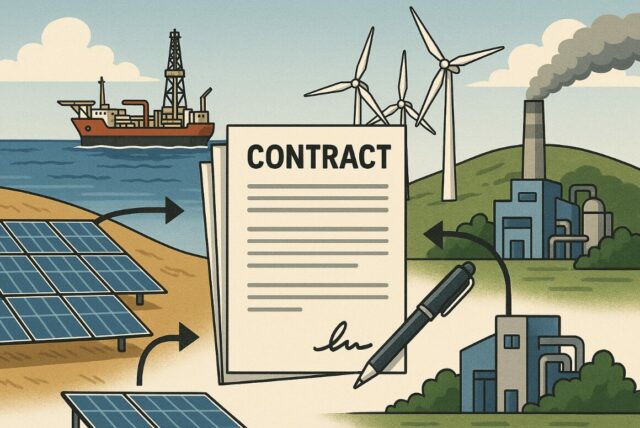The publication a few weeks ago of a study carried out by the WCC (World Commerce & Contracting) involving almost 200 organisations highlighted the specific features of contracts in the energy sector (more specifically oil & gas and energy or OGE).
Over and above the quantitative aspects, this study also identifies key points and areas for reflection in order to identify the particularities of contracts in the energy sector, as well as the way in which contract management can be a lever for performance.
So, as we did at the beginning of the summer for contract management in defence, we invite you to use this study as a basis for identifying the specific features of contract management in the energy sector! First of all, it should be noted that this sector has had relatively well-established practices for many years: the creation of SPVs and other dedicated companies, the use of standard contracts (FIDIC, NEC, etc.) and negotiations that cover similar subjects from one project to the next.
However, the economic, political and fiscal instability experienced by the business world since the post-COVID period has disrupted these practices, sometimes redistributing the cards and the balance of power between end customers, major principals and Tier 1 subcontractors.
According to the survey , 55% of the organisations questioned say they are more interested in contract management and recognise its key role in projects that are becoming increasingly complex.
Still on the subject of good news, it should be noted that among the sector’s contract management priorities are the improvement of internal processes (60%) and staff training (49%), two areas in which Prime Conseil is likely to lend a helping hand!
Now it’s time to get to the heart of the matter, by reviewing three key points from the WCC study.
A. The most negotiated clauses in the energy sector
The energy sector is unique in that it requires significant resources, both financial and human. As a direct consequence of this high mobilisation of cash and experts, all within tight schedules, subjects related to liability ceilings, prices and penalties make up the top 3 most negotiated clauses (see image below).

To play the game of the 7 differences with other sectors, we can also see that warranty issues are making their appearance in the top 10, while issues relating to intellectual property or termination are less important than in other areas.
B. The most important clauses in the energy sector
Second section, second question. When asked which clauses were the most important, the 200 organisations questioned gave different answers (reflecting the asymmetry between what is negotiated and what is important). The subjects of the SOW and the specifications (the famous specs) immediately come to the fore.
This is nothing new, however, as this clause is cited as the most important in many sectors. However, if we look at the specifics of the sector, we quickly identify change orders or riders, whose importance in such large-scale projects is easy to understand, as well as warranty and performance issues, which are also closely linked to the economics of such large-scale contracts.

As we can see, the negotiation and monitoring stages of contract execution are crucial for projects in the energy sector, both to ensure that exposure is properly defined upstream, and to ensure that contingencies, additional costs and other performance issues that may arise during execution are properly managed.
C. Clauses that give rise to difficulties and disputes
Here we come to the essential chapter of this article, since by comparing those clauses most exposed to (pre-)litigation with those that are most negotiated (whether in general in this study, or more specifically within your organisation), we can quite quickly identify areas of risk or at least levers for improving performance.
Here we have a rather tasty top 5 (since this top 5 alone helps to identify the role and importance of the contract manager) :
i. Lack of clarity about the SOW and objectives
Across all sectors, for 40% of respondents, this is the main source of claims and, more generally, of deterioration in the relationship between the parties to a contract. While this statistic is not surprising for practitioners, given that this lack of clarity is blatant on almost all projects, it is nevertheless surprising that this subject remains at the top of the polls year after year, despite the existence of tools and methods for improvement.
Prime Conseil’s tip: encourage the use of overviews and other visual elements that summarise the essential obligations of the parties, both in the offer and at the start of the project. Also clearly identify the elements/services/products that are “out of scope” and limit the use of “without limitation” and other verbiage that is likely to cause problems later on.
ii. A lack of understanding of the terms of the contract
It is not uncommon in the energy sector for each party to develop different interpretations and understandings as the project progresses. In some cases, these differences can ultimately prove to be so great that a project comes to a standstill. For example: can this type of event entitle me to an extension of the deadline and/or the assumption of additional costs?
Prime Conseil’s tip: organise clarification workshops during the course of the project when differences arise, and formalise the results of these discussions.
iii. Poor management of changes in circumstances
In the energy sector, projects are long-term, energy tariffs fluctuate, as do the standards and laws in force (on the environment, construction, permitting, etc.). Once again, it is not uncommon for disputes to arise as a result of changes that, according to some, upset the balance and economics of the contract, and according to others are merely unforeseen events that could have been foreseen beforehand.
Prime Conseil’s tip: there’s no magic wand that can be applied to all sectors and all organisations, but rather good practice: remember to capitalise on your experience from one project to the next so that you don’t repeat the same mistakes over and over again (delays in obtaining permits, connection times, revisions in the event of substantial changes in resale prices, etc.).
iv. A lack of maturity in the handover process to the project team
Now we’re getting down to the nitty-gritty: according to 58% of respondents (after all!), the lack of maturity (or even the non-existence) of their handover process between the team that won the tender and the team in charge of implementation is one of the main reasons for conflicts arising during implementation.
The reasons why certain clauses have been accepted, the commitments that may be made during negotiation sessions, or the unwritten requirements or constraints expressed by a customer during the tender phase are all elements that are rarely passed on to the project team that will have to carry out the work.
Prime Conseil’s tip: have a contract manager who can take part not only in the pre-sales phase, but also in the execution!
v. Poor contract management during the execution phase
Last but not least, also cited by nearly two thirds of respondents as the main cause of disputes: the absence or failure of contract management. We have already had the opportunity to write on this subject (link to article), but the attention of legal and financial teams tends to disappear once the contract has been signed.
When there is no contract management, the contract is often managed in reaction (once the event has occurred) rather than in anticipation.
Prime Conseil’s tip: you can see us coming, can’t you? Get yourself a contract manager!
Conclusion
This study illustrates the major contract management challenges facing players in the EMO sector.
These major contracts are capital-intensive, involve a large chain of subcontractors and generally extend over a number of years, making them particularly exposed to hazards of all kinds.
The answer to managing these contingencies, whether you’re an energy buyer or supplier, is to negotiate and manage your contracts more effectively. Easy to say, isn’t it? In practice, it’s a little more complex.
However, there’s nothing to stop you working in stages: better negotiation can be initiated by becoming better acquainted with the key clauses and stipulations that are likely to give rise to disputes and litigation, and better contract management can be organised by devoting a little time and energy to it, through training, and by ensuring that the other party or parties and the contract are always at the heart of your priorities.







